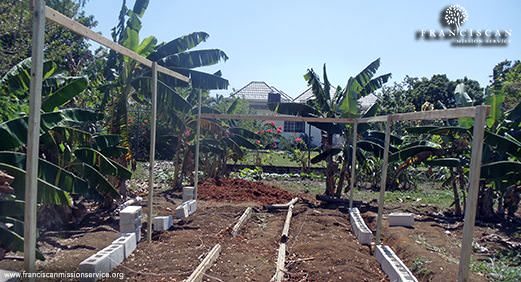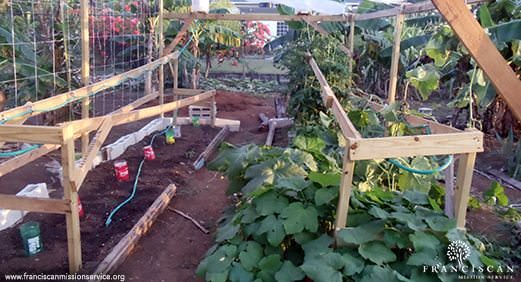Making it Rain

Editor’s Note: Missioner Brandon Newland reflects on the arrival of spring in Jamaica and the deeper life lessons that can be found in gardening.
Despite the somewhat mild temperatures of winter in Jamaica, spring is still the beginning of the growing season for many crops. Last year we attempted a rather grandiose garden with one of our clients. We had some successes and many failures, so this year I decided to try a different plan.
Learning to grow crops in an area that sees soaring temperatures well over 100 degrees, torrential rains, booming thunderstorms, hurricane type winds, and inexplicable droughts has given me the opportunity to install a drip irrigation system to counter all the troubles that Jamaican weather throws at us.
I have always been interested in gardening. The process of simply planting a seed and watching with patience as it grows into something large and yields edible fruits and plants still seems miraculous to me. After last summer, though, I learned that gardening takes much more than patience and wishful thinking. I did not understand the make-up of the soil here, nor was I properly informed of the intermittent sources of water. I had incorrectly assumed that in a tropical climate, water would be bountiful and crops would grow with only the smallest amount of human encouragement.
Though it is true that plants grow incredibly fast here when we have rain, it is also true that they die just as fast when the unforgiving heat leaves the soil hard and without nourishment. There are some plants that have adapted over centuries and thrive even in the worst circumstances, some that hang on for as long as possible aching for the next drop of rain to fall, and others who simply pack it in and say ‘I will try again next year.”
Farming has always been an easy analogy for life and we can all take lessons from growing food. You can be a person who does not prepare and leaves it up to outlying circumstances to decide your fate. You can be someone who prepares for some conditions and hopes that nothing unexpected will happen. Or, you can be someone who takes in all the information, makes a plan for all known circumstances, and adapts to new changes.
I myself have always been more of the middle person. I prepare for most things and hope that it will all work out. I think that a lot of the people we try to help here in Jamaica are more like the first group and leave too much up to fate.
Now, I understand the importance of the third type of planning. If I don’t plan properly for my crops, my plants will die. And considering we are growing the garden to help the soup kitchen, my preparations and abilities to adapt to different circumstances affect the others around me as well. When the success of something is solely dependent on the amount of time, care, and thought you put into it, you really appreciate the gifts it gives you.
Reflection Question: Which of these three types of people are you? How can you take more time to plan for your longer term goals?

